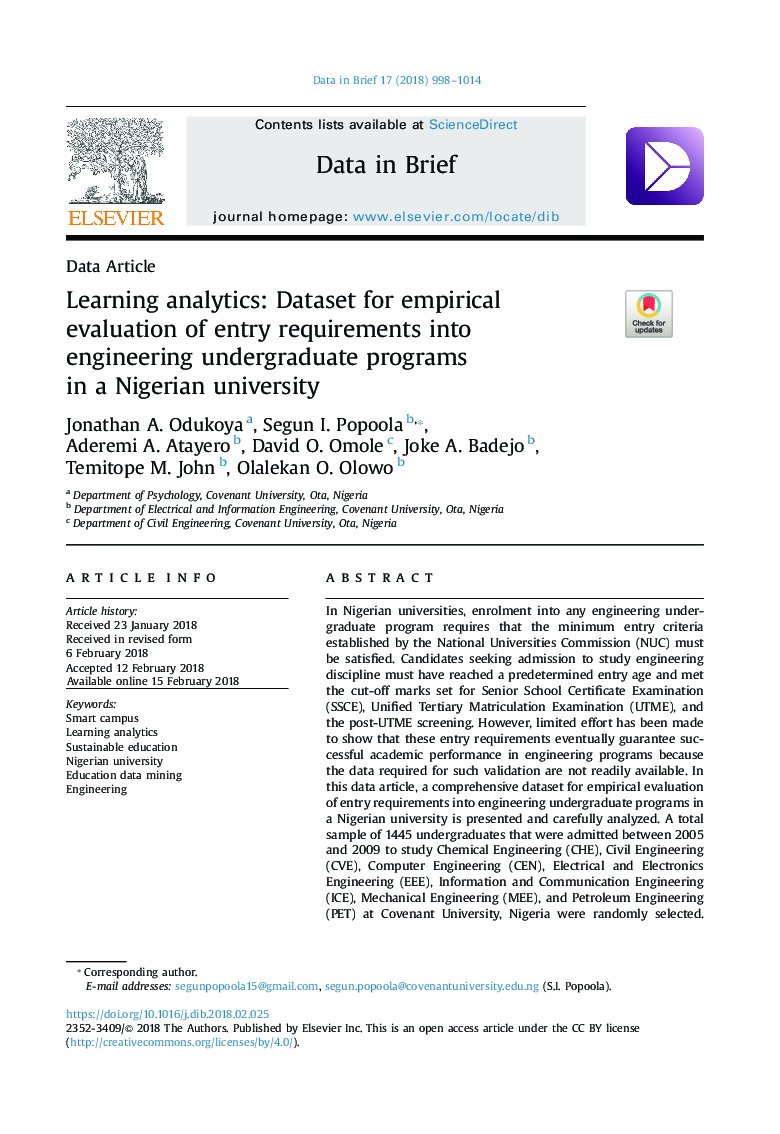| کد مقاله | کد نشریه | سال انتشار | مقاله انگلیسی | نسخه تمام متن |
|---|---|---|---|---|
| 6597136 | 1423851 | 2018 | 17 صفحه PDF | دانلود رایگان |
عنوان انگلیسی مقاله ISI
Learning analytics: Dataset for empirical evaluation of entry requirements into engineering undergraduate programs in a Nigerian university
ترجمه فارسی عنوان
تجزیه و تحلیل یادگیری: مجموعه داده ها برای ارزیابی تجربی از شرایط ورود به برنامه های مهندسی کارشناسی در دانشگاه نیجریه
دانلود مقاله + سفارش ترجمه
دانلود مقاله ISI انگلیسی
رایگان برای ایرانیان
کلمات کلیدی
پردیس هوشمند، تجزیه و تحلیل آموزش آموزش پایدار، دانشگاه نیجریه، داده های آموزشی، مهندسی،
موضوعات مرتبط
مهندسی و علوم پایه
مهندسی شیمی
مهندسی شیمی (عمومی)
چکیده انگلیسی
In Nigerian universities, enrolment into any engineering undergraduate program requires that the minimum entry criteria established by the National Universities Commission (NUC) must be satisfied. Candidates seeking admission to study engineering discipline must have reached a predetermined entry age and met the cut-off marks set for Senior School Certificate Examination (SSCE), Unified Tertiary Matriculation Examination (UTME), and the post-UTME screening. However, limited effort has been made to show that these entry requirements eventually guarantee successful academic performance in engineering programs because the data required for such validation are not readily available. In this data article, a comprehensive dataset for empirical evaluation of entry requirements into engineering undergraduate programs in a Nigerian university is presented and carefully analyzed. A total sample of 1445 undergraduates that were admitted between 2005 and 2009 to study Chemical Engineering (CHE), Civil Engineering (CVE), Computer Engineering (CEN), Electrical and Electronics Engineering (EEE), Information and Communication Engineering (ICE), Mechanical Engineering (MEE), and Petroleum Engineering (PET) at Covenant University, Nigeria were randomly selected. Entry age, SSCE aggregate, UTME score, Covenant University Scholastic Aptitude Screening (CUSAS) score, and the Cumulative Grade Point Average (CGPA) of the undergraduates were obtained from the Student Records and Academic Affairs unit. In order to facilitate evidence-based evaluation, the robust dataset is made publicly available in a Microsoft Excel spreadsheet file. On yearly basis, first-order descriptive statistics of the dataset are presented in tables. Box plot representations, frequency distribution plots, and scatter plots of the dataset are provided to enrich its value. Furthermore, correlation and linear regression analyses are performed to understand the relationship between the entry requirements and the corresponding academic performance in engineering programs. The data provided in this article will help Nigerian universities, the NUC, engineering regulatory bodies, and relevant stakeholders to objectively evaluate and subsequently improve the quality of engineering education in the country.
ناشر
Database: Elsevier - ScienceDirect (ساینس دایرکت)
Journal: Data in Brief - Volume 17, April 2018, Pages 998-1014
Journal: Data in Brief - Volume 17, April 2018, Pages 998-1014
نویسندگان
Jonathan A. Odukoya, Segun I. Popoola, Aderemi A. Atayero, David O. Omole, Joke A. Badejo, Temitope M. John, Olalekan O. Olowo,
